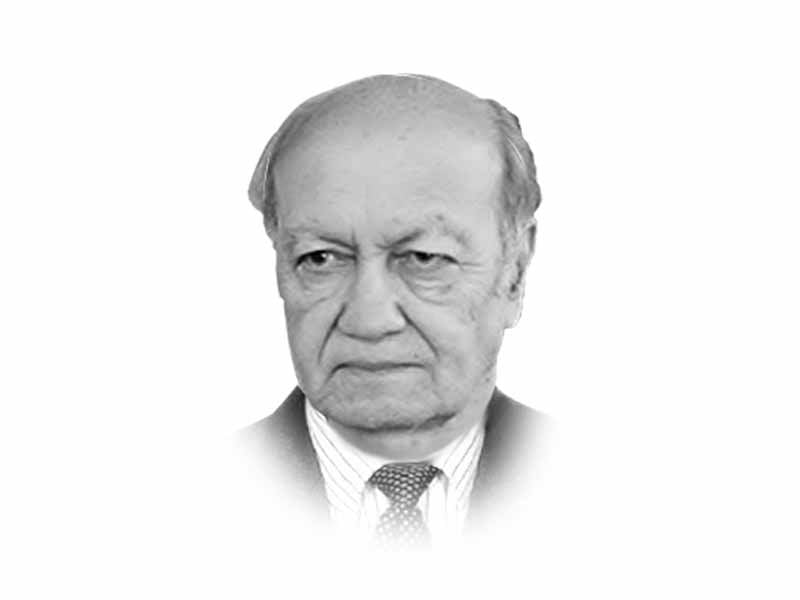
Unfortunately, the current blockade of the Nato logistic supply route by the Pakistan Tehreek-e-Insaf (PTI) is becoming a serious irritant in the relationship and has the potential of once again derailing the momentum that was built through efforts by both sides for their common good. Although, it is the PTI that is blocking the route, this being primarily an internal matter, the fallout will have to be borne by the federal government and will strengthen those lobbies in Washington that project Pakistan as a weak and unreliable ally.
With hindsight, it should be clear that the previous closure of Pakistani Ground Lines of Communications to Afghanistan did create difficulties for the US, but it managed alternative routes even if these were more expensive. For Pakistan, closing supply routes should have been its last card to play.
By blocking the route, Pakistan finds itself not only on the wrong side of the US, but also of Nato countries. As a responsible member of the international community, Pakistan should be extending its full cooperation at a critical time when the US and Nato are withdrawing their military hardware and equipment. Moreover, we could suffer seriously if the US and other countries react strongly to the closure of routes by suspending economic and military assistance. More importantly, Pakistan’s role as a regional player could also be undermined during the post-withdrawal phase in Afghanistan and could lead to our isolation.
A more prudent approach would be to leverage our position with the US and Nato countries by taking advantage of Pakistan’s strategic utility at this critical juncture, when a bulk of their forces are withdrawing from Afghanistan.
As of now, Washington needs maximum support from Islamabad on several counts — nudging the Taliban to come to the negotiating table, to persuade Afghanistan to sign the Bilateral Security Agreement, clear or, at least, contain the Haqqani and other militant groups in North Waziristan and pockets of Fata to prevent them from attacking US forces. Pakistan is also expected to effectively manage the border to prevent militant groups from joining the insurgency in Afghanistan in the post-withdrawal phase. There is a lot at stake for Washington for which it cannot risk an unfriendly relationship with Pakistan. Most US demands are in Pakistan’s own interest, too. The question whether it has the will and capability of undertaking these measures will be tested in the coming months.
Pakistan’s expectations from the US are no less. Prime Minister Nawaz Sharif has been insisting that Pakistan needs trade not aid from the US. This may be possible provided the energy situation improves and our products remain quality and pricewise competitive in textiles and other exportable items. Meanwhile, it is important that the government achieves fiscal, structural and policy related reforms, or else it will remain an outlier among the exporting countries.
Moreover, Islamabad will only receive foreign assistance from multilateral agencies, especially the IMF and the World Bank, if it has Washington’s nod.
We cannot overlook the hard reality that there is a strong anti-Pakistan bias and frustration in the US Congress and among certain elements within the administration. Misplaced expectations have only increased mistrust. Over the years, US policymakers have tarnished Pakistan’s image by branding its establishment duplicitous. Pakistan mirrors a similar adversarial image of America by projecting it as an unreliable ally. The media in both countries has been spreading toxic propaganda against each other, not realising that neither Pakistan nor the US are going to gain by stepping up the rhetoric. Pouring venom at the public level and expecting to have a functional, cooperative relationship at the official level is not sustainable in the longer term. The ill will it generates creates problems for the military, intelligence and other government agencies, and prevents them from cooperating.
In the event that Afghanistan fails to sign the Bilateral Security Agreement, Washington may be compelled to exercise the ‘zero option’, for which there is already growing support, at least, in some official circles and Congress. Pakistan is very clear that a residual presence of US forces after 2014 would contribute to Afghanistan’s stability and would serve its national interest. If, however, Washington is compelled to exercise the zero option, the question that comes to mind is, will it retain interest in Pakistan or pull out lock, stock and barrel from the region?
The total withdrawal option by the US could place an enormous burden on Pakistan. With no military and financial support from the US and the international community, it is unlikely that the Afghanistan government will be able to stand on its own. In the event of a civil war, a fresh influx of refugees from Afghanistan could be expected to stream in across the border into Pakistan. The security situation in the border areas could further worsen, with militants drawing strength and synergy from militant groups in Afghanistan.
Amid the vacuum in Afghanistan, it is possible that not only the Taliban but also al Qaeda and other radical elements jump in and unravel the country. The grim reality unfolding in Iraq and Syria should be a stark reminder of what could happen. In contrast, a stable Afghanistan and a peaceful tribal belt could transform Pakistan into a hub of energy and trade corridors running between South and Central Asia. This could be Pakistan’s great opportunity of truly moving away from the ‘strategic depth’ concept that was based on security considerations to trade, commerce, energy and tourism — altering the geostrategic dynamics of the region. As of now, this remains a distant dream.
Published in The Express Tribune, January 8th, 2014.
Like Opinion & Editorial on Facebook, follow @ETOpEd on Twitter to receive all updates on all our daily pieces.
COMMENTS (22)
Comments are moderated and generally will be posted if they are on-topic and not abusive.
For more information, please see our Comments FAQ



1731655243-0/BeFunky-collage-(61)1731655243-0-165x106.webp)








ET mod, will you please allow these comments for the purpose of clarity and to upgrade the debate. Thanks..
@shah:
Yours are the appropriate, brief and concise and the best comments in my opinio. After reading the article and the commentries of most others, my conclusion is that Pakistan needs defintely a cultural revolution for Nation building of the kind which the Chinese went through during Maos leadership. You have a former General asking for the stay of foreign troops in the regionon, other talking about Afghan reugees in Pakistan and some one else talking about Afghanistan being subdued and conquered multiple times. What a load of crap and lack of knowledge of the region. I am a foreigner and know that Afghanistan which has the majority of Pashto speaking tribes, who also happen to live across in the lterritory of Pakistan, in total of estimated more than sixty million, the largest tribal entity in the world. They have neither been defeated, subdued or conquerd in their history. They recognise no barriers and move across the unrecognised borderarely declassified the American might, leaving the American administration to use unmanned drone against them. Once the Americans have withdrawn, the former General reckons that the payback time will come for theose who have assisted in the invasion of Afghanistan, hence the gbberish of the author..
Rex Minor
@Wardak peshawar:
My point is without US approval you wouldn't have been able to acquire nuclear weapons.
Anyways, I've always found Pakistanis to be the brightest amongst the Muslims but perhaps Paksitan can use this "technogical might" to provide electricity to her people.
@Mir, How does that imply that we did not have what it takes to get a nuclear bomb. We worked hard and succeeded. You're making an excuse to coverup Pakistan's technological might. And Moscow gave India the bomb whole-sale because Moscow wanted India to do menial tasks around the globe ;)
Afghanistan has been conquered and subdued multiple times, whether by Mongols, Timurids, Arghun dynasties, Alexander the Great or the Mughals. People who create and talk policy should remember this fact. How Americans declare their actions in this sphere could be interesting. This is not the old times anymore though where hordes of central Asians could just move into Herat, Kabul and Kandahar and declare themselves kings and sovereign .
@Truth:
Umm.what? I said you got aid because of refugees but got nukes because of the Afghan-Soviet war. Re-read the sentence my friend.
Anyways, the Reagan administration downplayed Pakistan’s nuclear program because they wanted Zia ul-Haq’s help against the Soviets in Afghanistan.
Interesting article but implying that you can leverage your relationship with America through your Taliban contacts, influencing Afghan leadership or attacking the Haqqani has no credibility and the reasons are painfully obvious. Ain't going to happen. You can't even a simple supply line open.
If America retains a residual presence in Afghanistan, how will that help Pakistan? America has been there for the last decade and more. If America leaves in toto how does that help or hinder Pakistan? America was not there for a hundred years prior to 2000. Whether there was a local dispensation in Afghanistan, or a Russian one, or an American one, Pakistan's actions have been its own. Or not?
A bit too late to change the inevitable. Once the US troops leave Afghanistan, there will be utter chaos and misery in Pakistan and the Durand line. Syria, Iraq, Palestine are just an trailer.
@Lal Din: Do you honestly tell the world, apart from humanitarian help on hapless innocent refugees you have done nothing against afgan nation. If true, then i wonder why others fear you. pl note i dont use the word hate in true sense.
Mr. Lal it is not good way to say anybody to leave the place as you have orderd Mr. Shahid
The Pakistani ship has been navigated without a compass, rudder or anchor by unqualified personnel for over six decades. Its fate is like Columbus who went sailing for India but landed up in a different continent, thankfully without the same disastrous consequences. The country like Rip Van Winkle has been in a deep snooze and has suddenly realized that this is a very different world now where Intellectual capability and not military prowess, separates the winners from the losers. This calls for close cooperation between all progressive elements who share the same vision and human values that can be leveraged for the benefit and welfare of their citizens. Pakistan must decide where it wants to go and it will never be able to as long as a majority of citizens believe that the seventh century was the brightest one for all mankind. Being wedded to a long gone past will constrain humans from enjoying the present or striving for a better tomorrow. This "I" for myself must be replaced by "We" for all, so the country can stand some chance of course correction, enabling it to reach a better destination.
@Lal: Pakistan's only fault was that it gave you refuge. Not to one, two, or three but to three millions and some never left (1.5 million precisely). Can you tell me what passport Mr. Karzai had when he travelled to U.S.? All that Pakistan got in return was drugs, crime of all sorts, and kalashnikov. Any question?
@Lal Din :- As an Afghan I can ask you the same why doesn't Pakistan leave us alone too ???
@shah: I think you should have a look on this article again as that may change your perceptions as well as perspectives of things in the region. It is better not to mix the emotions with any intellectual exercise as it dilutes the academic spirit. I have been reading this General's essays since long and always found his analysis: well balanced, academic, and intellectually honest. Please do not jump to the conclusion just based upon your nationality or deep seated anti-Pakistanism. If you do not like what is written in Pakistani newspapers, please hit your own and leave us alone. We have managed our affairs despite all road-blocks created by you. Just leave us alone.
In reality the General sahib would like Pakistan to take over the war burden from US and place it on its own shoulders so that US can leave comfortably. The fact that a war that US could not win in 12 years despite it being the superpower with all the might of its weaponry and military technology seems to escape him. That Pakistan will be caught in a generational war inside Pakistan which given the history of previous such wars - Chengiz, Mughals, British, Russian and USA - will not be winnable and will literally destroy Pakistan. Instead of following the combined lead of all of Pakistan's elected leadership in pursuing a peaceful path, the respected General sahib would want Pakistan to walk in to a blind alley, a limitless dark tunnel of death and destruction, for God only knows how long. Pakistanis are already reaping the fruits of previous twelve year's policies with the daily increasing level of militancy in all parts of Pakistan. Imagine how bad it would be if General sahib's advice is taken. Pakistan needs to get out of behaving as a mercenary state and needs to look for its own interests, for a change.